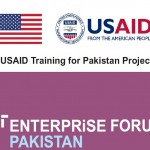Pakistan is a nation that’s been gripped for years by political instability, sectarian violence, natural disasters, and poverty. It is also home to one of the world’s largest populations of young people, entrepreneurs of tomorrow, who are transforming Pakistan into a high-tech powerhouse. Karachi is home to some innovators, who are hoping that today’s generation will fuel Pakistan’s rise to becoming the next tech hub.
Umair Aziz on why he opted for Pakistan for his startup
Creative Chaos is one of Asia’s fastest growing tech start-up company founded by Umair Aziz. The company comprises of a team of Web site developers currently working on a project for Coca-Cola which will go up in 27 to 28 different countries. Previously, Creative Chaos has worked with Amazon, Microsoft and Intel.
Umair Aziz reported his one and ONLY secret to success is keeping the location of the company discreet. Karachi. Karachi – is indeed a chaotic commercial capital of Pakistan, that ranks as one of the world’s most violent. According to him
“We don’t want to be out of the race by advertising that we’re based in Pakistan. There’s a very negative stigma associated with the country.”
It is unfortunate that a robust startup like Creative Chaos cannot operate in the international market with Pakistan being associated to its profile. Hence, prospective customers see nothing on Creative Chaos’ Web site about its location. Technically, it’s headquartered in San Francisco. There was one time, during a collaboration with a company, when the client found out that almost all workers are based in Pakistan. Once hired, Aziz says, his company has never been removed from a job which is the company’s greatest pride.
“People in the U.S. really don’t know that there’s a world outside of Taliban, and there’s a world outside of, everything that they hear on CNN and BBC all the time.”
In this world projected as the ‘world of terror’ Aziz carved out a profitable niche back in 2000. Umair Aziz, graduate from Ohio, decided to return back to his native city Karachi leaving his job at a tech firm in Boston. He was confident that there were hundreds and thousands of people like him who could join him and his organization. He expresses
“It was a risk, but I was betting on the talent. I was betting on people just like me.”
Umair is one of a handful of thriving Pakistani start-ups, designing Websites, databases and applications for global clients. Statistics shows a healthy 35 percent annual growth in the tech sector and Aziz expects his firm to grow fivefold by 2020.
See Also: Can Karachi be the Silicon Valley of Pakistan?
Jehan Ara believes in the immense potential of youth in Pakistan
In raw numbers, though, that talent pool could be a lot larger, says Jehan Ara – President – The Nest, a tech entrepreneur. The country’s population is about 200 million people and 70 percent of them below the age of 30. According to Jehan’s vision, the potential is amazing in the young talented pool. She strives to figure out on how to channel this potential efficiently and is leading an effort to scout that talent, trying to create what the technology business calls an ecosystem to foster creativity and new business.
Jehan Ara is the founder of The Nest which is one of a handful of so-called incubators that have been built in Pakistan. At this incubator, 13 teams of techies chosen from more than a hundred applicants are working on what a panel of judges decided were promising business ideas.
“We are looking for young people who’ve developed a minimum viable product themselves while at home or at university and we know that they are committed to doing this. And then, once they get here, then we can help them further.”
This for Pakistan, is a rare work environment, and not just because it’s offered for free to potential entrepreneurs but also because it has reliable power, broadband and hardware which many cannot afford on their own. Nest also offers a connection to global resources from donors to the facility, including Google and Samsung.
The U.S. government also financially supports The Nest. At Nest, incubatees practice their pitches in speed dating sessions, which is a classic Silicon Valley approach to lure investors. They also subject each other to sometimes withering critiques.
“It’s only when the local investors get really interested that the industry is going to take off, the start-up culture is going to take off.” says Jehan Ara.
Conclusion
One big worry is Pakistan’s precarious security situation, which could drive many entrepreneurs to take off, but for jobs abroad. Yet people like Umair, Jehan and many others leave secure jobs abroad to come back home and bring a change in entrepreneurial ecosystem of Pakistan for a better tomorrow.
This report was made for the PBS NewsHour, by Fred de Sam Lazaro in Karachi, Pakistan in a partnership with the Under-Told Stories Project at Saint Mary’s University of Minnesota.
Image: ItsMyViews





 USAID funds MITEFP’s business acceleration program 2015
USAID funds MITEFP’s business acceleration program 2015